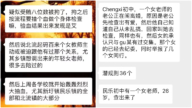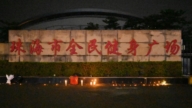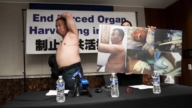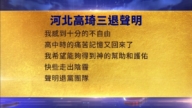【新唐人2014年02月14日讯】西班牙最高法院法官2月10号签发逮捕令,以犯有“反人类罪”罪名,全球通缉中共前国家主席江泽民、及前总理李鹏等几人。中共政府提出抗议,西班牙议会11号开始讨论限制法院受理涉外人权案的法案。大陆维权律师指出,西班牙国会被一些利益集团所左右,对“普遍管辖权”做出限制,对于全球人权事业是一个倒退。
据美国《华尔街日报》报导,西班牙下议院周二已经以179对163的投票,通过了这个涉外人权案的提案。之后再交给上议院讨论和投票。这个提案要求,在法院起诉国外人权犯罪的时候,被告必须是西班牙人或西班牙居民。而且在人权侵犯发生的时候,受害人也必须是西班牙公民。
受到国会审视的是被称为“普遍管辖权”的国际法学说,它允许任何国家的法庭针对具有“国际特征”的罪行,比如种族灭绝罪,酷刑罪,战争罪和反人类罪,而起诉他们国土之外的个人。
人权团体包括“国际特赦”认为,“普遍管辖权”是一个“必不可少的工具”。“国际特赦”在周一发布一份联合声明,强烈谴责西班牙国会提议对西班牙法律作出改变。
大陆维权律师江天勇表示,西班牙法庭按照对反人类罪等罪犯,进行管辖引渡,完全符合联合国的有关精神以及普世价值,现在人们看到这种结果,显然是中共利用中国纳税人的钱,在向全世界正义的力量施加压力。
大陆维权律师江天勇:“而且某些国家有些人它也正是面对这种压力抵抗不了。但是不管怎么说,无论中共如何施加压力,无论是有些国家有些人在接受中共施压,实际上是一种倒退的做法,但是不管怎么做,它都不会改变正义对这些违法犯罪份子的审判。”
没有一个国家比西班牙更加自信的使用“普遍管辖权”的学说。西班牙于1985年开始采纳“普遍管辖权”。最著名的例子是在1998年,当智利独裁者皮诺切特访问伦敦,西班牙法官巴尔塔萨加尔松发出传票,英国当局逮捕了皮诺切特,但后来拒绝将他引渡到西班牙,最终让他回到智利,在那里他面临刑事指控,直到死亡。
虽然西班牙法官的国际判决为他们赢得人权活动人士的称赞,但是也常常造成跟西班牙重要经济伙伴的摩擦。西班牙执政党——“人民党”国会代表团发言人为提案辩护说,“普遍管辖权承诺许多,但是没有达成除了外交冲突之外的任何结果。”
江天勇反驳这种说法。他说,皮诺切特的例子大家都记忆犹新。怎么能说没有结果呢?全世界看到独裁者,当他行走在世界各地的时候,是有地方能对他进行审判的。
江天勇:“有这个裁定在那里搁着,当这些罪犯走到与西班牙有司法协定引渡条约的国家,它是非常危险的。这些犯罪份子实际上它只能老老实实待着,哪儿也不敢去。这对他来说也是一个威慑﹔第三,让全世界人民看到,反人类罪,迫害人权的犯罪份子,是有地方对他进行正义的审判的。如果改变了这一点,至少这样正义的地方将失去一块。”
大陆维权律师唐吉田表示,如果西班牙政客不能保持清醒的头脑,被一些利益或利益集团所左右,做出限制的规定,那么一方面将是一种倒退,另一方面对于全球的人权工作都会产生很大的消极影响,开了一个不好的先例。从长远来讲,也不利于西班牙国内人权的保护。
大陆维权律师唐吉田:“在大是大非面前,国会议员应该抛弃眼前的一些不良因素,从职业伦理、从世界人权的发展,尤其要从西班牙的国家形象,以及本国人权和世界人权的紧密联系,做出明智的抉择。”
西班牙高级法院法官Ismael Moreno,周一发出针对前中共领导人江泽民和其他四名官员的逮捕令。他们被指控在西藏实施种族灭绝。
不过,西班牙国家警察局发言人拒绝回答,警方将什么时候执行命令,并请求国际刑警发出“红色通告”。
采访编辑/秦雪 后制/钟元
Communist Regime Pressures Spain
to Restrict Universal Jurisdiction
On February 10 a Spainish High Court judge issued an
international arrest warrant for former Chinese leaders
Jiang Zemin and Li Peng on charges of genocide in Tibet.
While the Chinese Communist Party (CCP) firmly opposes the
court’s order, on February 11the Spanish Parliament began the
debate to constrain Spanish judges in prosecuting international
human rights cases.
Chinese human rights lawyers believe the Spanish parliament
was swayed by interest groups to restrain universal jurisdiction,
and indicate that it is a step backwards for the global cause of
human rights.
The Wall Street Journal reported the restraint on exercising
the international human rights law won lower house approval
Tuesday by a vote of 179 to 163. It will next go to the Senate.
The bill specifies that only Spaniards or foreigners who reside
in Spain are subject to prosecution; mandating that plaintiffs
must be Spanish citizens at the time the torture was alleged to
have occurred.
The bill constrains the Spanish judiciary’s exercise of universal
jurisdiction, the principle Spanish judges have used to prosecute
international human rights cases outside of Spain.
These are genocide, the crimes of torture, war crimes, and
crimes against humanity.
Human rights groups including Amnesty International
consider universal jurisdiction an “essential tool" and issued
a joint statement on Monday strongly condemning the proposed
changes to Spanish law reported the New York Times.
Human rights lawyer Jiang Tianyong says that the Spanish
courts exercising the universal jurisdiction for crimes against
humanity is in full compliance with the spirit and the universal
values of the United Nations.
The change of the law is obviously what the Communist regime
has pressured the world justice with its taxpayers’ money.
Jiang Tianyong, human rights lawyer: “There are people in
some countries who could not resist the pressure.
Regardless of how the CCP has exerted pressure and how
some people could not resist the pressure, it is a step backwards.
However, trial of justice against these criminals will never be
changed."
No country has enjoyed more than Spain to use the doctrine
of universal jurisdiction with more confidence.
Spain adopted the universal jurisdiction in 1985.
The most famous example was in 1998, when the Chilean
dictator Augusto Pinochet visited London.
Spanish judge Baltasar Garzón Real ordered his arrest in
London, where he was detained for a year and a half before
being returned to Chile, where he faced criminal charges
until death.
While Spanish judges’ international activism has won them
praise from rights activists, it has often caused friction with
some of Spain’s key economic partners.
Alfonso Alonso, the spokesman for the Popular Party
delegation in Congress, said, Universal justice “promises a lot,
but doesn’t achieve anything more than diplomatic conflicts,"
reported the World Street Journal.
Jiang Tianyong refutes this argument.
He takes Pinochet’s case as an example saying the world sees
the end of a dictator, who was put on trial wherever he was.
Jiang Tianyong: “This rule tells the criminals that, it is a
dangerous place for them to be in any country with a treaty
with Spain.
Those criminals could only stay put and that’s a threat to them.
It also tells the world that crimes against humanity are subject
to justice trials.
The change of the law means the world is missing such justice."
Human rights lawyer Tang Jitian says that when the Spanish
politicians lose their sober minds by restricting the universal
jurisdiction under pressure from interest groups, it is a step
backward and a huge negative impact to global human rights.
The Spain will initiate a bad precedent.
In the long run, it is not conducive to the protection of human
rights in Spain.
Tang Jitian, human rights lawyer: “Facing right or wrong,it
is the MPs informed choices to abandon some adverse factors
and maintain the ethics, the human rights, and the Spanish
image as a country in protecting human rights.
Both domestically and internationally."
Spanish High Court Judge Ismael Moreno issued an arrest
warrant against former Chinese leader Jiang Zemin and four
other officials on Monday, for accused of genocide in Tibet.
However, the Spanish National Police spokesman refused
to say when the police will execute the command and
request Interpol to issue the “Red Notices."
Interview & Edit/QinXue Post-Production/ZhongYuan




























